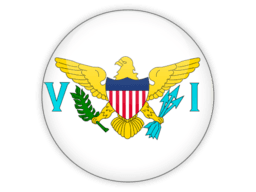
Regions of Virgin Islands U.S.
Explore 3 regions
Cities of Virgin Islands U.S.
Discover 4 cities across 3 regions
Saint Croix Island(1)
Saint John Island(1)
Saint Thomas Island(2)
The United States Virgin Islands, commonly called the US Virgin Islands or USVI, is a group of islands and islets located in the Caribbean Sea. The territory consists of four main islands: St. Croix, St. Thomas, St. John, and Water Island, as well as numerous smaller islands and cays.
The US Virgin Islands are an unincorporated territory of the United States, which means they are under US sovereignty but not part of any state. The official language is English, and the US dollar is the currency.
Tourism is the main industry in the US Virgin Islands, with beautiful beaches, clear waters, and tropical climate attracting millions of visitors every year. The islands also have a rich history, having been colonized by the Danish in the 17th century before being sold to the United States in 1917.
St. Croix is the largest of the four main islands and has a diverse economy, with tourism, agriculture, and oil refining being the main industries. St. Thomas is the most densely populated island and is a major tourist destination, known for its beaches, shopping, and nightlife. St. John is the smallest of the three and is largely protected by the Virgin Islands National Park, making it a popular destination for hiking and snorkeling.
The US Virgin Islands have a unique culture, blending Caribbean and American influences. Music and dance are an important part of local life, with genres such as calypso, reggae, and steel drum music being popular. The islands also have a rich culinary heritage, with dishes such as conch fritters, callaloo, and Johnnycakes being local favorites.
The US Virgin Islands are an overseas voting district of the United States, meaning that US citizens residing in the territory can vote in federal elections. The territory is represented in Congress by a non-voting delegate in the House of Representatives, who can introduce legislation but cannot vote on the House floor.
Telephone Code
340
Local Emergency Phone
911 (USA)
Vaccinations
See WHO recommendations
Climate
Subtropical, tempered by easterly trade winds, relatively low humidity, little seasonal temperature variation; rainy season September to November
Currency (Code)
Dollar (USD)
Electricity/Voltage/Plug Type(s)
110 V / 60 Hz / plug types(s): A, B
Major Languages
English, Spanish or Spanish Creole, French or French Creole
Major Religions
Protestant 59% (Baptist 42%, Episcopalian 17%), Roman Catholic 34%, other 7%
Potable Water
Opt for bottled water
International Driving Permit
Suggested for non-US citizens.
Road Driving Side
Left
Tourist Destinations
Charlotte Amalie; Virgin Islands National Park; Trunk Bay Beach & Underwater Snorkel Trail; Buck Island Reef National Monument; Magens Bay; Cruz Bay; Coral World Ocean Park
Major Sports
Soccer, cricket, baseball, basketball
Cultural Practices
Men without shirts and women in bathing suits or skimpy attire are frowned upon anywhere but the beach.
Tipping Guidelines
Tipping is the same as the US or Europe - 15% of your restaurant check, more if service has been exceptional. An extra dollar or two for your taxi driver is fine, more if he/she handles bags or conducts a good island tour.
Souvenirs
Hand-painted or dyed clothing, pottery, conch jewelry, rum, teas, spices, land and seascape art, carved wooden items, straw work items
Traditional Cuisine
Fish and Fungi — cornmeal and okra cooked into a thick mash served with fried whole fish seasoned Creole-style and topped with a sweet onion gravy
Geography
Area
total: 10,887 sq km
land: 10,887 sq km
water: 0 sq km
Climate
influenced by continental air masses resulting in relatively cold winters with heavy snowfall and hot, dry summers and autumns; Mediterranean and alpine influences create regional variation; maximum rainfall between October and December
Natural resources
nickel, lead, zinc, magnesium, lignite, kaolin, chrome, bauxite
People and Society
Population
1,964,327 (2023 est.)
Ethnic groups
Albanians 92.9%, Bosniaks 1.6%, Serbs 1.5%, Turk 1.1%, Ashkali 0.9%, Egyptian 0.7%, Gorani 0.6%, Romani 0.5%, other/unspecified 0.2% (2011 est.)
Languages
Albanian (official) 94.5%, Bosnian 1.7%, Serbian (official) 1.6%, Turkish 1.1%, other 0.9% (includes Romani), unspecified 0.1%; note - in municipalities where a community's mother tongue is not one of Kosovo's official languages, the language of that community may be given official status according to the 2006 Law on the Use of Languages (2011 est.)
Religions
Muslim 95.6%, Roman Catholic 2.2%, Orthodox 1.5%, other 0.1%, none 0.1%, unspecified 0.6% (2011 est.)
Population growth rate
0.62% (2023 est.)
Government
Government type
parliamentary republic
Capital
name: Pristina (Prishtine, Prishtina)
Economy
Economic overview
small-but-growing European economy; non-EU member but unilateral euro user; very high unemployment, especially youth; vulnerable reliance on diaspora tourism services, curtailed by COVID-19 disruptions; unclear public loan portfolio health
Real GDP (purchasing power parity)
$21.226 billion (2021 est.)
Real GDP per capita
$11,900 (2021 est.)
Agricultural products
wheat, corn, berries, potatoes, peppers, fruit; dairy, livestock; fish
Industries
mineral mining, construction materials, base metals, leather, machinery, appliances, foodstuffs and beverages, textiles
Exports
$3.138 billion (2021 est.)
Exports - partners
Albania 16%, India 14%, North Macedonia 12.1%, Serbia 10.6%, Switzerland 5.6%, Germany 5.4% (2017)
Exports - commodities
mining and processed metal products, scrap metals, leather products, machinery, appliances, prepared foodstuffs, beverages and tobacco, vegetable products, textiles and apparel
Imports
$6.128 billion (2021 est.)
Imports - partners
Germany 12.4%, Serbia 12.3%, Turkey 9.6%, China 9.1%, Italy 6.4%, North Macedonia 5.1%, Albania 5%, Greece 4.4% (2017)
Imports - commodities
foodstuffs, livestock, wood, petroleum, chemicals, machinery, minerals, textiles, stone, ceramic and glass products, electrical equipment
International Airports in Virgin Islands U.S.
Discover 2 major airports serving Virgin Islands U.S.
Mark Virgin Islands U.S. as Visited
Add Virgin Islands U.S. to your personal travel map and track your journey around the world. Share your adventures and see your progress grow!